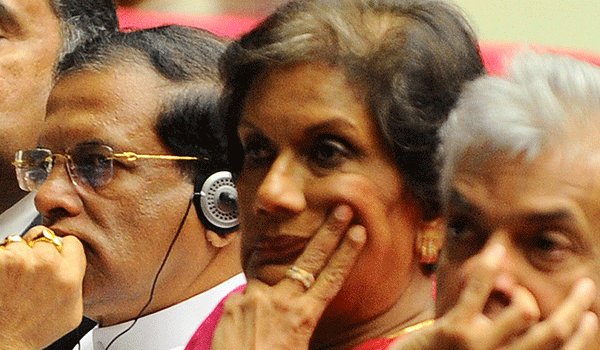The competition is intense. Politicians have brandished bottles of poison meant for rivals at public rallies. A suspected murder victim of 2012 has been exhumed. Two persons have been killed by a yet unexplained shoot-out at a rally. And a distinguished former diplomat of Tamil origin, herself threatened by the Tigers, has slapped a Rs 250 crore defamation suit against the country’s well-liked foreign minister, Mangala Samaraweera, for accusing her of being an LTTE supporter.
But when Sri Lanka’s master politician Mahinda Rajapaksa re-enters the political fray, barely seven months after he was ousted from presidency, with his eyes set — this time — on the post of prime minister, what else can one expect but sharp polarisation?
Since his defeat in January, Rajapaksa had lain low, fuelling speculation that the 69-year-old former president had gone into retirement. Meanwhile, new President Maithripala Sirisena energetically revived investigations of corruption against Rajapaksa and his family.
Sirisena, the acknowledged ‘clean leader’ who ousted the former president of his own Sri Lanka Freedom Party (SLFP) in a ‘rainbow’ alliance along with their political rival, Ranil Wickremasinghe of the United National Party (UNP), has struggled to implement his ‘100-day promise’ of two key constitutional reforms and ‘good governance’.
All this while, a peculiar scene has played out in parliament. The SLFP sprawled on both sides of the house: Sirisena supporters aligned with PM Wickremasinghe and his UNP on the one side, and Rajapaksa loyalists with those of the SLFP-led United People’s Freedom Alliance (UPFA), on the other. Sirisena did manage to pass the promised 19th Amendment and therewith returned some powers, which had earlier been usurped by presidents, to the office of PM. He has also put in place an effective election commissioner to ensure no misuse of state resources for the polls.
But rocked by a financial scam involving PM Wickremasinghe’s UNP, public impatience and disillusionment with the government grew rapidly.
There were crossovers to Rajapaksa’s SLFP faction. The 100-day deadline began to close in. Sirisena finally dissolved parliament and called for fresh elections. But not without paying a price. Under pressure from the majority of his own SLFP and its UPFA coalition and against all his earlier declarations, Sirisena was forced to name Rajapaksa as the party’s candidate for the parliamentary poll next week.
To anyone familiar with Rajapaksa’s prowess at politics and whether he wins the forthcoming election or not, his return to centre-stage holds few surprises.
Rajapaksa has earned unequivocal acknowledgement even from his foes, for being the only president to decimate the Tamil Tigers. An achievement that boosted his popularity among the Sinhalese majority and among the families of the armed forces who had fought the long civil war. Consequently, he is contesting from Kurunegala, a region full of army families and not from his traditional base Hambantota.
Rajapaksa’s re-entry did have some other side-effects too. Apart from other defections, the Sinhalese chauvinist Jathika Hela Urumaya (JHU) which exited from the UPFA last year, is now contesting under Wickremasinghe’s United National Front for Good Governance. Rajapaksa’s return to the fray is also playing out on the existing constellation between Sirisena and party rival Wickremasinghe in a somewhat bizarre way.
Thus ahead of the August 17 poll, we have an SLFP head of state, who secretly wishes his own SLFP’s Rajapaksa defeated by their mutual rival UNP’s PM candidate Wickremasinghe, so that the same ‘grand coalition’ that had ousted the former president can carry on its programme of “good governance” uninterruptedly for the next four and a half years.
There are comic absurdities too. President Sirisena’s portrait features on both the campaign banners of the SLFP-led UPFA, as well as that of the rival UNP-led UNFGG. Publicly though, the President has been obliged to call for the defeat of the UNP.
The moderate Tamil National Alliance too, is set to lose some of its sheen among voters in the Tamil North and East with the emergence of, among others, the Crusaders for Democracy, a party consisting of former LTTE cadres, who now swear by a united Sri Lanka and peace. One opinion poll has predicted a victory for Wickremasinghe, since most Tamil voters, it is believed, would rather support his coalition than that of the alleged ‘war criminal’ Rajapaksa.
But fortified by the strong support base he still enjoys among the Sinhalese majority of the country, the Rajapaksa juggernaut is chugging on regardless. Aided by a group of canny and experienced diplomats like Dayan Jayatilleka and distinguished academic, Rajiva Wijesinha and shielded by a holy, elephant-hair bracelet around his wrist, Rajapaksa has apologised for his ‘past mistakes’, crafted a new campaign and promised significant changes to, among others, the country’s foreign policy. “Good relations with India are axiomatic and will be a cornerstone of the UPFA’s foreign policy,” the Rajapaksa team has declared.
If Rajapaksa wins, is named PM and keeps his word, it may mark the beginning of a new relationship between the two closest relatives in the south Asian family of blood-brothers.
(hindustantimes.com)






